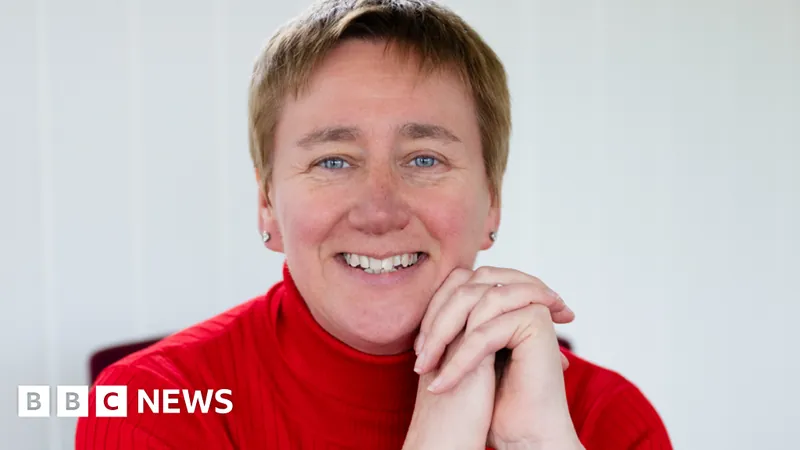
Urgent Call for Improved Surgical Menopause Care: Women's Voices Demand Change
2024-12-28
Author: Wei
As surgical menopause affects hundreds of women across the UK, there is a growing frustration that the National Health Service (NHS) is failing to provide adequate care and support to those impacted. Diane Danzebrink, a dedicated menopause support campaigner from Norfolk, has called for a comprehensive review of how surgical menopause is managed, emphasizing the urgent need for all healthcare professionals to be properly equipped to prepare their patients.
Danzebrink, who founded the organization Menopause Support, sees a glimmer of hope in the increasing awareness around menopause issues over the past decade. However, she argues that fundamental changes are still needed to ensure every woman receives high-quality care when facing this significant health transition. Referring to the distressing experiences of women she has encountered, Danzebrink revealed that she collected and reviewed 319 personal accounts from women who felt inadequately informed about the potential side effects of surgical procedures, particularly the removal of both ovaries.
Notably, many of these women reported having undergone surgeries such as hysterectomies without sufficient discussions on the side effects, including the risk of being thrust into premature menopause. For instance, one woman shared her painful experience of severe vaginal atrophy only three years after her surgery at the young age of 28, a situation she was neither prepared for nor educated about.
According to a survey of 521 UK women aged 20 to 59 conducted by Menopause Support, a staggering 74.5% reported that they were not informed by healthcare professionals about the side effects following the removal of both ovaries. Alarmingly, 62% of respondents eligible for Hormone Replacement Therapy (HRT) stated that this option was not discussed prior to their surgery, with only 36% receiving a prescription immediately post-operation. HRT is commonly recognized as the frontline treatment for alleviating menopause symptoms, and national guidelines recommend that those who experience premature menopause should be offered HRT until the age of 50-51, the typical age range for natural menopause.
Reacting to this worrying trend, Danzebrink expressed her disappointment while searching for clinical guidelines on surgical menopause through the Royal College of Obstetricians and Gynaecologists (RCOG) website, only to find a lack of such resources. "It is baffling that we are not providing essential information for both the public and clinicians concerning surgical menopause," she remarked, stressing the need for standardized guidance that empowers healthcare providers to fully counsel their patients before surgery and to deliver appropriate ongoing care afterward.
Dr. Ranee Thakar, president of the RCOG, highlighted the college’s strategy of consolidating guidance to prevent redundancy and ensure that clinicians follow the most reliable protocols. She acknowledged the significant impact that menopause can have on women’s lives and reaffirmed the RCOG's commitment to providing accurate and accessible information. Dr. Thakar mentioned the ongoing efforts to enhance the RCOG’s Menopause Hub, which is intended to support healthcare professionals with updated resources, including insights on surgical menopause, as well as the development of a national menopause program being spearheaded by experts at University College London.
As calls for consistent and comprehensive care for women undergoing surgical menopause intensify, the spotlight remains on the necessity for actionable change within healthcare systems. Women deserve to be equipped with the knowledge that informs their health choices, and ensuring that healthcare professionals are suitably trained is a crucial step toward facilitating this goal.




 Brasil (PT)
Brasil (PT)
 Canada (EN)
Canada (EN)
 Chile (ES)
Chile (ES)
 Česko (CS)
Česko (CS)
 대한민국 (KO)
대한민국 (KO)
 España (ES)
España (ES)
 France (FR)
France (FR)
 Hong Kong (EN)
Hong Kong (EN)
 Italia (IT)
Italia (IT)
 日本 (JA)
日本 (JA)
 Magyarország (HU)
Magyarország (HU)
 Norge (NO)
Norge (NO)
 Polska (PL)
Polska (PL)
 Schweiz (DE)
Schweiz (DE)
 Singapore (EN)
Singapore (EN)
 Sverige (SV)
Sverige (SV)
 Suomi (FI)
Suomi (FI)
 Türkiye (TR)
Türkiye (TR)
 الإمارات العربية المتحدة (AR)
الإمارات العربية المتحدة (AR)